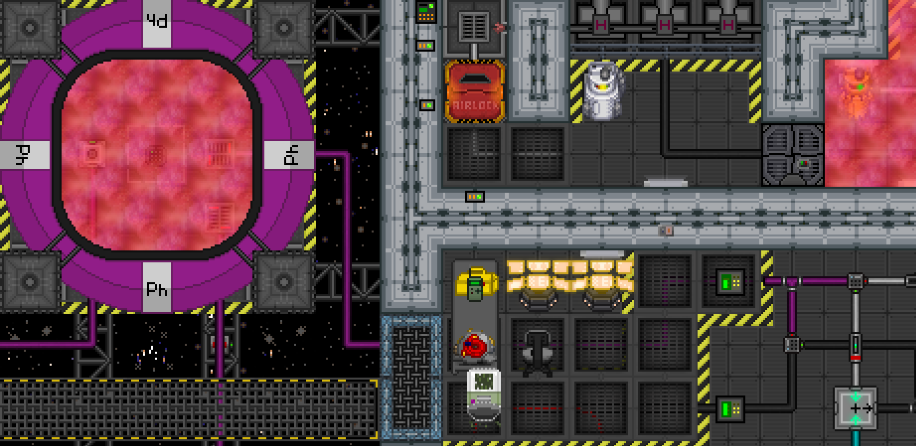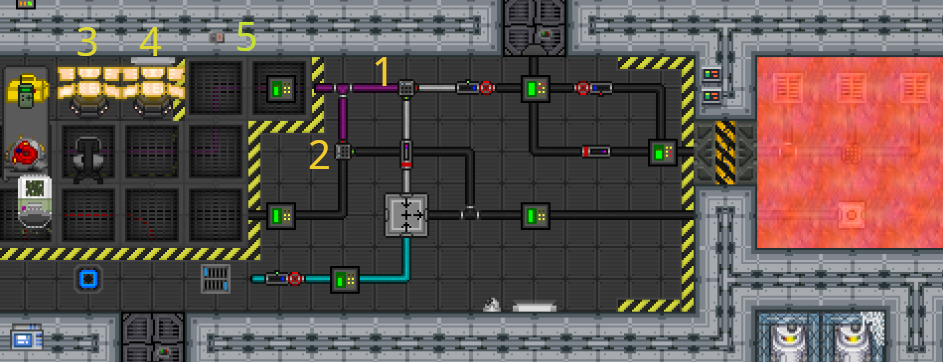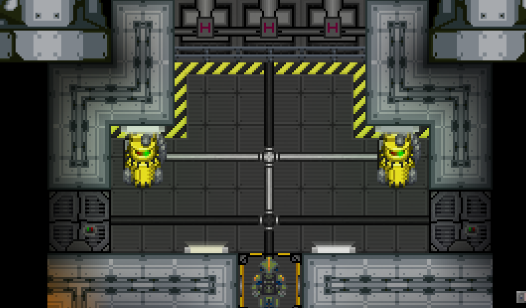Sandbox:ShakyJake
Guide to Thrusters
This guide assumes a basic knowledge of pipes and gas mechanics, if you need to brush up on those read the Guide to Atmospherics
So the Bridge are pressuring you to set up the thrusters asap so they can go drive into a meteor field and cause you more problems, what do you do? There are two propulsion rooms on the SCCV Horizon at the aft of Deck 1 and these control gas flow to three thrusters each.
The SCCV Horizon's thrusters run on Phoron, and they have two operational modes. One where you simply dump cold Phoron directly from the storage tank and out into space, and one where you mix the Phoron with Oxygen and ignite it which is both a significantly more efficient use of expensive Phoron and much more effective as you can reach maximum pressure very easily.
Phoron Storage Tank
Atmospherics has a tank just outside the hull where the ship's supply of phoron is stored. It has outputs that lead to the filtering and mixing apparatus as well as directly to the port thruster room. The west-most console in the port thruster controls the output vent that leads to the thrusters.
Port Thruster
The Port Thruster is accessible through the atmospherics room and is only accessible to Atmospherics Technicians or Engineers that try hard enough if there are no Atmos Techs.
This room contains pipelines for bringing phoron and oxygen to the thrusters, a mixer for setting the desired ratio of oxygen and phoron, and a reaction chamber where you will ignite your mixture. There are two digital valves that allow you to set the hot/cold gas mode of the thrusters. It also has a console for controlling the phoron tank output and for controlling the input and output vents of the reaction chamber.
Importantly the port thruster has a pipe that leads from the mixer all the way to the starboard thruster. All mixing is done in the port thruster and the resulting mixture is provided to the starboard thruster.
The port thruster also has an airlock into space which can come in handy for fixing meteor damage to the exterior, or creating a breach yourself in case of an accidental phoron fire!
Starboard Thruster
The Starboard Thruster room is accessed through maintenance and is on the other side of aft Deck 1 from the port thruster. It is accessible to all engineering personnel. The machinery here behaves exactly the same as the port thruster with the exception that no mixing happens here. There is a direct line from the port thruster that will feed phoron or phoron-oxygen mix to this area.
Setting up the Thrusters
These instructions are simplified, suggested values for pressures are slightly arbitrary, and it does not go into detail. The operating principles are covered later in this guide in full.
Cold Phoron Mode
For the simplest and safest setting, you can simply pump cold phoron into the thrusters. The Port Thruster is initially in this mode, with the top digital valve being set to accept cold phoron from the phoron storage tank and output it to the pressure regulator on the east side of it. However, the other digital valve that controls the feed to the starboard thruster is intiailly set to accept from the empty mix pipe.
The setup procedure is:
- Go to Port Thruster.
- Toggle the digital valve (1) so the cold phoron flows directly to the thrusters.
- Toggle the digital valve (2) so the cold phoron will flow to the starboard thrusters.
- Max the phoron storage tank output pressure via the west console (3).
- Toggle the starboard feed digital valve so the green icon points north (2).
- Maximize the pressure regulator east of the top digital valve.
- Go to the Starboard Thruster.
- Toggle the digital valve so the output is West.
- Maximize the pressure regulator west of the digital valve.
- Inform the Bridge the thrusters are filling up.
After a few minutes the thrusters will have enough gas pressure to produce a modest acceleration. It is bottle-necked by the output flow from the phoron storage tank, however and the thrust will drop quickly when the thrusters are fired repeatedly.
Hot Phoron Mode
This requires a bit more setup, but will produce significantly better results. Instead of just pumping phoron into the thrusters, you first mix it with oxygen and pump it into a chamber where the oxygen is burned. This produces a very hot Carbon Dioxide and Phoron mixture that can be then pumped into the thrusters.
The setup procedure is:
- Go to the Port Thruster.
- Maximize and turn on all the high-power pumps and pressure regulators in the room.
- Go to the east console (4) and maximize the chamber input and turn it on. Make sure the output is off.
- Wait until the chamber reaches around 300 kPA pressure.
- Hit the igniter button on the wall (5).
- Go to the east console (4) and maximize the output pressure and turn it on.
- Go to the Starboard Thruster.
- Maximize all the high-power gas pumps.
- Maximize and turn on the chamber input. Make sure the the output is off.
- Wait until the chamber reaches around 300 kPA, again.
- Hit the ignition switch.
- Maximize and turn on the chamber output.
- Inform the Bridge the thrusters are warming up.
Operating Principles
Thrust is based on the pressure and mass of the propellant. For this reason Phoron makes the best propellant, as it has a high mass. The limitation on the thruster output is the maximum allowed pressure in a pipe, which is around 15,000 kPA. The ideal situation is one in which you maintain 100% Phoron in the thruster pipes at 15,000 kPA and replace all propellant that is used between thruster firings, which can happen every few seconds if the helm requires it. However this is not possible by simply pumping gas out of the phoron storage tank.
Therefore it is beneficial to heat up the Phoron so that you can reach high pressures with less Phoron removed from the storage tank. A higher temperature means you have used less phoron. The temperature can be controlled by adjusting the mixer in the Port thruster. A higher percentage of Oxygen in the mixture will result in higher temperature, but also a higher percentage of Carbon Dioxide in your propellant which is less massive than Phoron.
It is also important to note that you can melt the walls of the reaction chamber if you burn too hot. Which can cause extreme damage to the Horizon and its personnel.
Emergency Procedures
In the event that there is damage to repair, you put the wrong mix in, or you're about to melt the walls - There are buttons on the walls in each propulsion room that operate the blast doors around the reaction chambers. You can open the exterior one and vent all your gas out into space. Make sure to turn off the input when you do this as well!
Improving the Thrusters
It is very possible to improve the design of the thrusters by replacing a few pipes. To address certain limiting factors:
Gas Flow to the Thrusters
Pressure regulators can be useful, but are largely not in the thruster design especially when you are using the hot phoron mode and they essentially act like a normal straight pipe segment. You can replace these with high-power pumps to improve gas flow - Note that high-power pumps can have a significant power usage when pumping from low to high pressures and adding more of these puts more strain on the APC.
Improving Hot Gas Capacity
When the Helm thrusts, it will remove a portion of the gas from the thrusters and therefore lower the pressure in the pipeline. You can help keep the thrusters at a high pressure for longer in extended use by increasing the amount of hot gas that can be held at one time. The easiest way to do this is to add some connectors and canisters as in the above image. In this example the amount of gas readily available is increased by around 60%.
Carbon Dioxide Filtering
It is possible to filter out the Carbon Dioxide from the hot propellant, leaving only the Phoron. This means that the average mass of the propellant is higher, and so the thrust is higher. It may be necessary to use multiple filters to keep up with the required flow rate, and you will have to figure out where to put the Carbon Dioxide you have removed. Will you send it to scrubbers, store it in canisters or dump it directly into space?
Power Usage
The thrusters use a significant amount of power when pulsed, and the pumps will as well. It can be worth getting some higher capacity power cells in the APCs. If your propulsion room runs out of power the Bridge won't be able to thrust at all with those!


